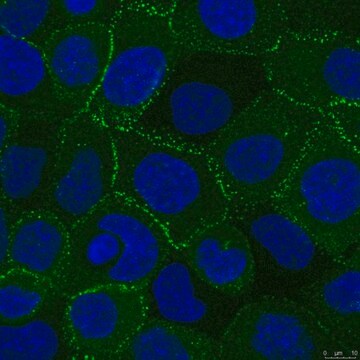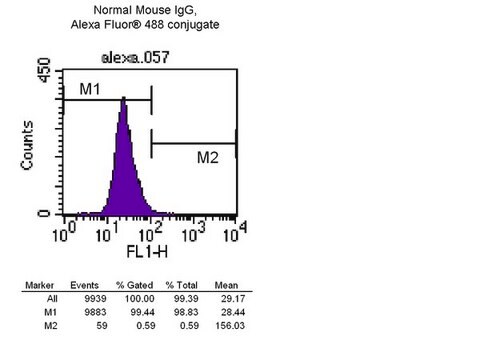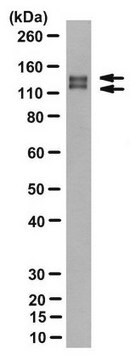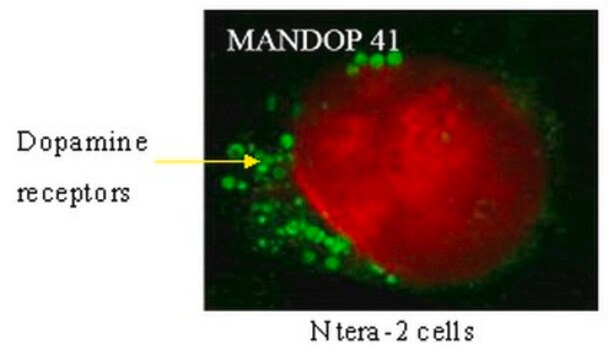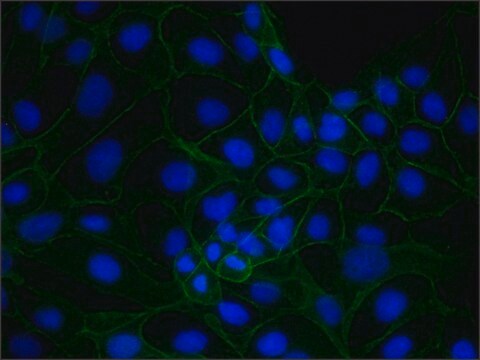MABT118
Anti-Desmoglein-1 Antibody, clone 32-2B
clone 32-2B, from mouse
Synonym(s):
Desmoglein-1, Desmosomal glycoprotein 1, DG1, DGI, Pemphigus foliaceus antigen
About This Item
Recommended Products
biological source
mouse
Quality Level
antibody form
purified immunoglobulin
antibody product type
primary antibodies
clone
32-2B, monoclonal
species reactivity
human
species reactivity (predicted by homology)
bovine (immunogen homology)
technique(s)
immunocytochemistry: suitable
immunofluorescence: suitable
western blot: suitable
isotype
IgG2aκ
NCBI accession no.
UniProt accession no.
shipped in
wet ice
target post-translational modification
unmodified
Gene Information
human ... DSG1(1828)
General description
Immunogen
Application
Immunofluorescence Analysis: A 1:1,000 dilution from a representative lot detected Desmoglein-1 in human tonsil tissues.
Western Blot Analysis: A representative lot from an independent laboratory detected Desmoglein-1 in bovine epidermal desmosomal cores and in human keratinocyte cell lysates. (Vilela, M. J., et al. (1995). J Cell Sci. 108(Pt 4):1743-1750.).
Immunofluorescent Analysis: A representative lot from an independent laboratory detected Desmoglein-1 in MDCK cells (Vilela, M. J., et al. (1995). J Cell Sci. 108(Pt 4):1743-1750.).
Immunohistochemistry Analysis: A representative lot from an independent laboratory detected Desmoglein-1 in human epidermal tissue (Maruani, A., et al. (2008). Am J Clin Pathol. 130(3):369-374.).
Cell Structure
ECM Proteins
Quality
Western Blot Analysis: 0.5 µg/mL of this antibody detected Desmoglein-1 in 10 µg of human tonsil tissue lysate.
Target description
Physical form
Storage and Stability
Analysis Note
Human tonsil tissue lysate.
Other Notes
Disclaimer
Not finding the right product?
Try our Product Selector Tool.
Storage Class Code
12 - Non Combustible Liquids
WGK
WGK 1
Flash Point(F)
Not applicable
Flash Point(C)
Not applicable
Regulatory Listings
Regulatory Listings are mainly provided for chemical products. Only limited information can be provided here for non-chemical products. No entry means none of the components are listed. It is the user’s obligation to ensure the safe and legal use of the product.
JAN Code
MABT118:
Certificates of Analysis (COA)
Search for Certificates of Analysis (COA) by entering the products Lot/Batch Number. Lot and Batch Numbers can be found on a product’s label following the words ‘Lot’ or ‘Batch’.
Already Own This Product?
Find documentation for the products that you have recently purchased in the Document Library.
Our team of scientists has experience in all areas of research including Life Science, Material Science, Chemical Synthesis, Chromatography, Analytical and many others.
Contact Technical Service